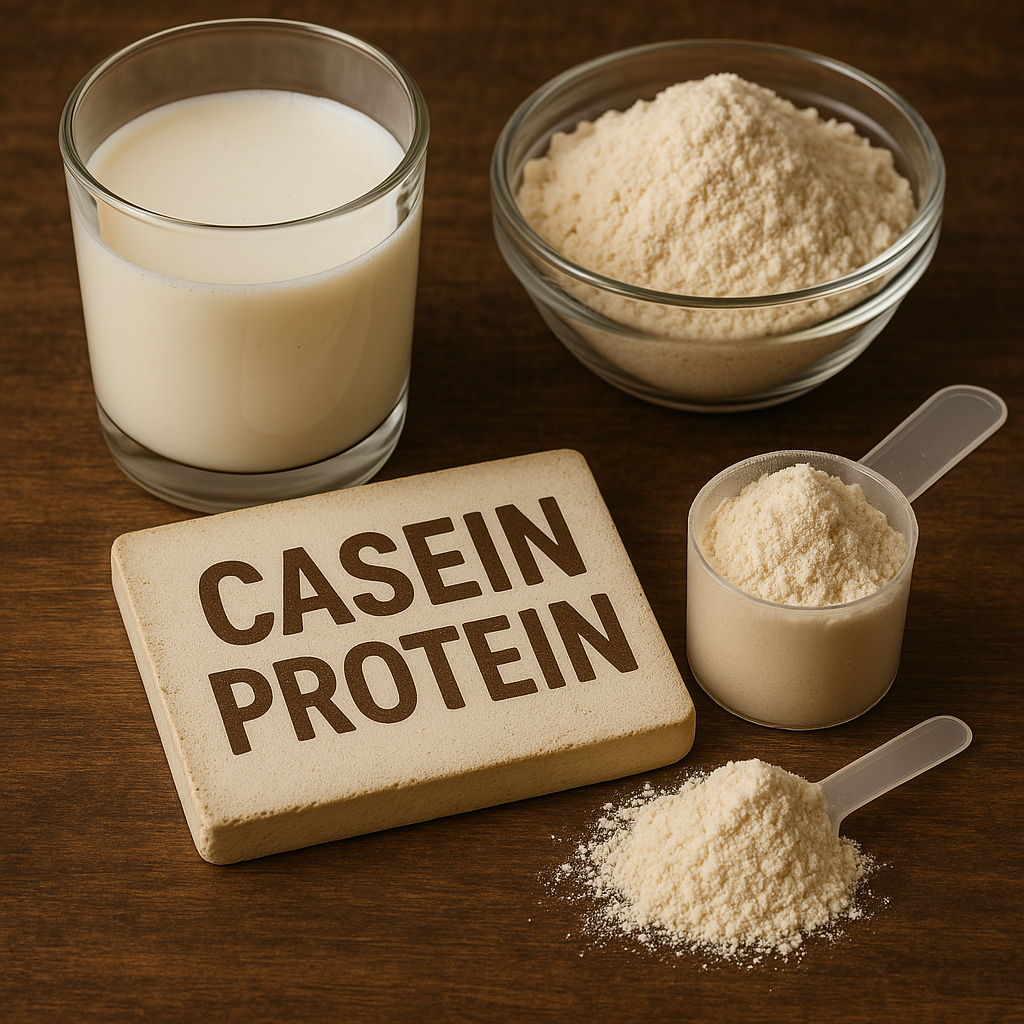Casein protein is a slow-digesting protein found in milk. It releases amino acids slowly, making it ideal for muscle repair and growth over long periods, like overnight. This article explains what is casein protein, how it compares to other proteins, its benefits, and how to use it.
Key Takeaways
-
Casein protein, derived from milk, is a complete protein offering all nine essential amino acids, and is recognised for its slow digestion, making it ideal for muscle repair and sustained nutrient supply.
-
Incorporating casein protein promotes muscle growth, aids in weight management by increasing satiety, and contributes to bone health due to its calcium content.
-
When selecting casein supplements, prioritise high-quality options like micellar casein from reputable brands, ensuring minimal processing and adherence to health regulations.
Understanding Casein Protein
Casein protein is a vital component of milk protein, accounting for approximately 80% of the protein in cow’s milk. This protein is derived through a meticulous process involving draining water from skim milk, washing curds, and grinding them into powder. Often referred to as a complete protein source, casein proteins provide all nine essential amino acids required for various bodily functions. Its slow release of amino acids into the bloodstream makes it particularly effective for muscle repair and growth. Additionally, milk proteins contribute to these benefits.
Unlike other proteins that might be quickly absorbed, casein’s slow release protein ensures a steady supply of nutrients, making it an excellent choice for sustained muscle protein synthesis. This unique property is why many fitness enthusiasts and athletes prefer consuming casein protein, especially before long periods without food, like overnight.
Casein vs. Whey Protein
When comparing casein protein to whey protein, the differences in digestion and absorption rates are notable. Casein protein digests at a much slower rate because it forms a gel in the stomach, which prolongs digestion. In contrast, whey protein is rapidly absorbed by the body, making it ideal for post-workout recovery when quick protein uptake is beneficial.
While both whey protein and casein protein have their merits, the choice between them often depends on your fitness goals and timing. Casein’s slow release protein of amino acids is perfect for overnight muscle repair and maintaining a steady supply of nutrients, whereas whey protein’s fast absorption is advantageous immediately after a workout.
Thus, incorporating both into your regimen can offer the best of both worlds.
Types of Casein
Micellar casein is the most common form of casein protein supplements, celebrated for its slow digestion and sustained protein release. Each serving typically provides around 24.5 grams of pure protein, ensuring a steady supply of amino acids over several hours. Furthermore, micellar casein is gluten-free and contains no artificial additives, making it a preferred choice among health-conscious consumers.
Due to its unique properties, micellar casein stands out among other casein forms. Its prolonged nutrient release makes it ideal for maximizing muscle recovery and growth during extended periods of fasting, such as overnight.
Benefits of Consuming Casein Protein
Consuming casein protein offers a multitude of benefits, making it a valuable addition to anyone’s diet. From aiding muscle growth and recovery to supporting weight management and bone health, casein protein provides a comprehensive approach to enhancing overall fitness and well-being. Casein protein powder is an effective way to boost your daily intake of this beneficial protein.
Exploring the specific benefits of casein protein reveals its role in muscle growth and recovery, its impact on weight management, and its contributions to bone health.
Muscle Growth and Recovery
Casein protein is a powerhouse for muscle growth, thanks to its high leucine content, an amino acid essential for building and repairing muscle tissue. Casein protein’s slow and steady release of amino acids helps reduce muscle breakdown and maintain muscle mass, especially during long periods without food.
Casein’s slow digestion ensures a consistent supply of amino acids to your muscles, promoting optimal recovery and growth. This quality is particularly beneficial for overnight muscle recovery, balancing protein levels and keeping your muscles well-nourished even while you sleep.
Weight Management
Casein protein aids weight management by increasing feelings of fullness and delaying hunger. Consuming casein before meals can reduce overall food intake compared to other protein types, making it easier to maintain a calorie deficit. Promoting satiety and satisfaction after meals, casein can be a game-changer for those aiming for weight loss.
Moreover, micellar casein is low in fat, carbs, and sugar, making it an ideal choice for those looking to lose weight without sacrificing protein intake. Its versatility allows it to be mixed into various foods, such as oatmeal or yogurt, enhancing meal flexibility and convenience.
Bone Health
Casein protein supports bone health by providing a significant source of calcium, essential for bone density and preventing osteoporosis. Calcium derived from casein is crucial for keeping bones strong, particularly as we age and the risk of bone-related issues increases.
Incorporating casein protein into your diet supports muscle growth, weight management, and overall bone health, making it a well-rounded addition to your nutritional regimen.
How to Use Casein Protein
Incorporating casein protein into your diet can be straightforward and highly beneficial. There are two main ways to add casein to your diet: using casein protein powder in shakes and smoothies or mixing it into various food items. However, before starting any new supplement regimen, it’s always advisable to consult with a healthcare provider, especially if you have any underlying health conditions.
Those with lactose intolerance should discuss with a healthcare provider to ensure that casein supplements won’t cause discomfort. With proper guidance, you can effectively incorporate casein protein into your diet and reap its numerous benefits.
Best Times to Consume Casein
Consuming casein protein before sleep aids overnight muscle recovery by providing a steady supply of amino acids. This keeps your muscles well-nourished throughout the night, promoting better muscle repair and growth.
Micellar casein can also be consumed between meals to maintain sustained protein levels. This is particularly beneficial for maintaining steady protein intake throughout the day, supporting overall muscle health and recovery.
Casein Protein Recipes
Using casein protein in delicious recipes makes it easier to enjoy its benefits. A popular recipe is the chocolate peanut butter casein shake, made by blending chocolate casein powder, almond milk, peanut butter, banana, and cocoa powder.
Coffee lovers might enjoy a mocha casein protein shake, which combines chocolate casein powder with cold brewed coffee, whole milk, cocoa powder, and maple syrup. For a fruity twist, try a vanilla berry smoothie with vanilla casein powder, mixed berries, banana, low-fat milk, Greek yogurt, and optionally honey.
Another refreshing option is the tropical casein protein shake, made with vanilla casein powder, pineapple chunks, banana, coconut milk, and Greek yogurt. These recipes provide a tasty way to consume casein protein while enhancing your overall protein intake.
Potential Downsides of Casein Protein
While casein protein provides several health benefits, it's equally important to consider its potential drawbacks and how it may affect certain individuals. people do not experience side effects from consuming casein protein, but those with specific allergies or intolerances should exercise caution. However, those with specific allergies or intolerances should exercise caution.
Potential issues related to allergies and intolerances, as well as the risks associated with overconsumption of casein protein, should be considered.
Allergies and Intolerances
Individuals with dairy allergies may experience symptoms such as skin reactions, respiratory issues, or gastrointestinal distress when consuming casein protein. Those with a milk allergy and casein allergy should avoid casein protein and seek alternative protein sources.
Additionally, people with lactose intolerance may experience digestive discomfort when consuming casein protein. Understanding your body’s reactions and consulting a healthcare provider if necessary can help avoid adverse effects.
Overconsumption Risks
Overconsumption of casein protein can pose serious health risks, particularly for individuals with kidney disease. Excessive protein intake can cause a buildup of toxins, leading to severe health complications.
Moderating your protein intake and consulting with a healthcare provider can help avoid these risks.
Choosing Quality Casein Supplements
Choosing high-quality casein supplements is crucial for maximizing their benefits. Micellar casein, the common form of casein powder, typically contains 24 to 27 grams of protein per serving. Calcium caseinate, known for its high digestibility, is another type of casein often used in supplements. High-quality casein protein supplements should undergo minimal processing to maintain their nutritional integrity.
Understanding how to read labels effectively and knowing some trusted brands can help you choose the best casein products available.
Reading Labels
When selecting a casein protein powder, look for products that adhere to FDA regulations for health claims and labeling. Pay attention to additives, as these can vary significantly between brands. Reliable brands offer clear sourcing information and transparent ingredient lists, ensuring you know exactly what you’re consuming.
Verify the protein’s source on the label; high-quality casein should originate from milk or casein-specific sources. This ensures you are getting a product that meets high standards of quality and purity.
Summary
In summary, casein protein offers a wealth of benefits, from supporting muscle growth and recovery to aiding in weight management and enhancing bone health. Understanding the differences between casein and whey protein, knowing how to use casein effectively, and being aware of potential downsides are crucial for making informed decisions. By choosing high-quality casein supplements and incorporating them into your diet thoughtfully, you can optimize your fitness and health journey. Whether you’re looking to build muscle, manage your weight, or improve your overall well-being, casein protein can be a valuable ally.





Understanding What is Keto Diet: A Comprehensive Guide
What is Paleo Diet: Benefits, Drawbacks, and Meal Ideas